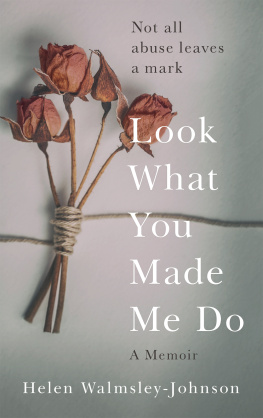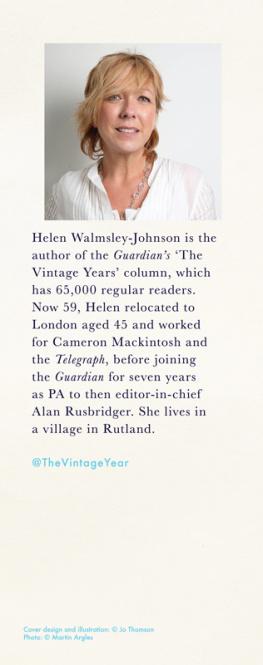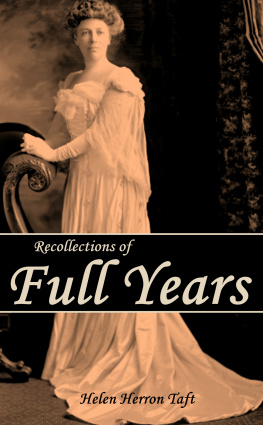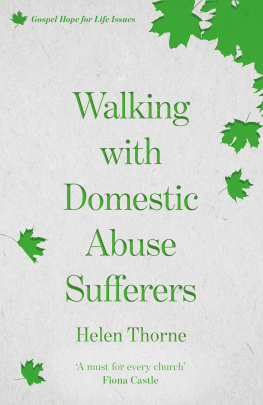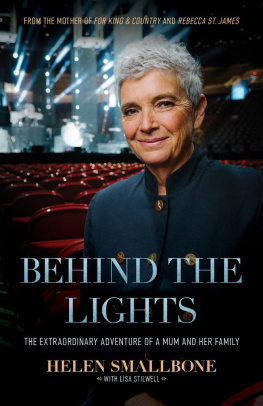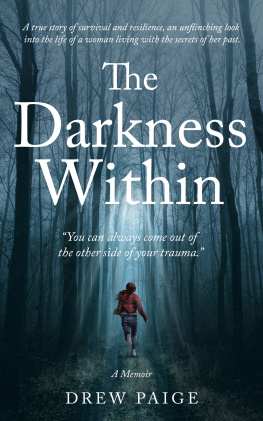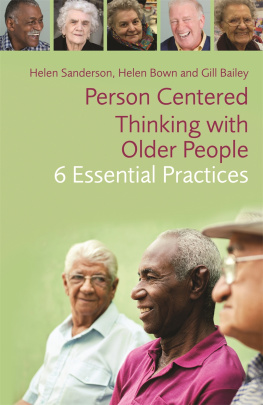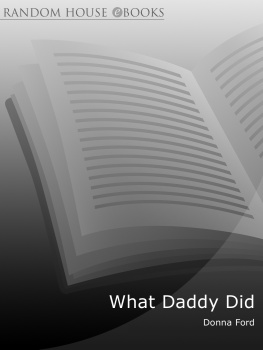For my girls
Weve got something in common, you and I. We are both alone in the world.
Daphne du Maurier, Rebecca
Contents
Introduction
Why did I do this?
Why did I decide to write a book charting my progress through two relationships with controlling, abusive men, exposing all my guilt, humiliation and shaming mistakes; why have I revisited painful workplace memories of a controlling, abusive woman and why have I made myself remember things I would much, much rather forget? Why have I put myself through that?
I have asked myself each of those things, many times, while Ive been writing Look What You Made Me Do and especially on the days when I felt it was all too much and couldnt bring myself to get down more than a handful of words. The answer is because I had to... because I am not alone, because I am one of many and I want to know why.
I can trace the origins of this book to a mild obsession with The Archers on Radio 4, specifically the moment at the beginning of 2013 when Rob Titchener first turned up in the fictional village of Ambridge. His charming manner, and the way he claimed to have fallen so quickly and helplessly in love with single mum Helen Archer, generated a queasy feeling of recognition. The programme is broadcast daily (except for Saturdays) but work commitments meant I had to catch up with the weeks events by listening to the Sunday-morning omnibus and joining in the #thearchers Twitter feed a sizeable part of the fun. As Rob swept Helen past all the usual relationship milestones with reckless speed, almost all my fellow tweeters seemed to strongly approve of this turn of events (so romantic), delighted that at long last Helen had found the One. I kept my doubts about Rob to myself but I had a niggling feeling that Id met him before and began combing my own history for clues.
Helens story progressed through real time, which made it all the more powerful because it showed very clearly how insidiously the form of domestic abuse known as coercive control takes hold. My Archers Twitter timeline became punctuated with Why does she stay? and Leave him, Helen. By the point where she had been rushed into marriage, agreed to Rob having parental responsibility for her son, been told how to dress, tracked on a mobile phone, isolated from her friends and family, raped, slapped, disempowered and humiliated, the omnibus tweet-along had changed to I cant listen to this anymore and disbelief that an intelligent middle-class woman who ran her own business in a close rural community could be suckered like this. Then inevitably some listeners began referring to Helens previous mental-health issues at about the same time as her husband.
With the benefit of first-hand experience and hindsight, I realized that there is a basic misunderstanding of how domestic abuse, and coercive control, works, and I began to feel an overwhelming compulsion to set something down about what had happened to me, despite having tried to ignore the fact that it had happened for a decade or more.
It took me almost a month to wring out a 2,000-word article and the only way I could find to start it was to muddle this real Helens story with that of the fictional Helen. I didnt formally pitch the idea to anyone I wasnt even sure I could write it. It was only towards the end that I came out with it and wrote, That happened to me too not this but that, still distancing myself, still hiding. Whenever I tried to articulate what I had been through, I felt paralysed by shame. In this, again, I am not alone.
By the time I was ready to send the piece It went viral.
Then something remarkable happened. One of my Twitter followers, Paul Trueman @paulwtrueman got in touch. He also listened to The Archers, had read my article and wanted to do something to raise money for victims of domestic abuse. He asked me if I thought it was a good idea (yes!) and where the money should go. Send it to Refuge, I said, thinking of all the times Id almost called them and never found the courage. Pauls initial target was set at 1,000 but topped 7,000 in the first twenty-four hours. Within a week the Helen Titchener (ne Archer) Rescue Fund had reached 50,000. At the time of writing the total stands at a staggering 173,000. The messages left by hundreds of donors show the reach and effect of domestic abuse. I am really not alone.
Domestic abuse is like cancer: everybody knows somebody. Its only when you start to speak about it that you find out just how many women have been through it and carry that burden about with them. It affects the everyday lives of hundreds of women. It affects mine.
Of course, men can be victims of domestic abuse too. I choose to say women because the majority of those affected are women, and by quite a substantial margin:
The volume of domestic abuse prosecutions completed rose in the year 2015/2016 to 100,930, the highest level ever recorded. Where gender was recorded, 83.3 per cent (71,706) of victims were female and 16.7 per cent (14,406) were male.
Every week, in England and Wales, two women thats one woman every three days.
One in four women will
In one study 95 out of 100 survivors of domestic abuse
The 2014/2015 Crime Survey for England and Wales found that 63 per cent of female abuse victims had experienced non-physical abuse
Bearing in mind the suggestion of one report that a woman is assaulted thirty-five times before her first call to the police, these figures are a glimpse at an undiscovered country. Women suffer in silence for years and because the very nature of abuse is control through fear, shame and guilt some never speak about it at all. But by not speaking, women who have suffered leave control in the hands of the abusers. Speaking about it is problematic but it strips away the stigma and robs what has been done to us of its power. It is, trust me, both a relief and a release. But most important of all, it helps us to identify this form of abuse and protect ourselves against it.
But how do we recognize the pattern of an abusive relationship, which starts like any other and somehow slowly twists out of shape? The key is that word pattern because there is a pattern and its always the same. The similarity is the thing that strikes me most when I talk to other survivors, and most of what people know about domestic abuse is told from the victims point of view. The story in this book is told from my point of view it is, as it says on the cover, a memoir. But I hope it also supplies the missing voice that of the abuser. You can tell people youve been disarmed, frightened, loved, confused, desperate and despairing but how do you explain how that happened when you dont understand it yourself? You need the words.
I have an archive of material because Franc (not his real name) and I wrote to each other. Dozens of notes, emails and letters. Thousands and thousands of words and I kept them all, or most of them. What he wrote meant so much to me that I squirrelled everything away, and when he cast aside what I had written to him I kept those letters, too. I also have my diaries and they allowed me to construct a timeline. I began by sorting and filing everything into chronological order. When Id done that I went to work with a highlighter pen and tracked the path of our relationship the pattern. I saw very clearly what had happened to me and how it had been done, and I saw both sides.

